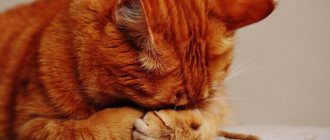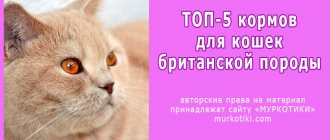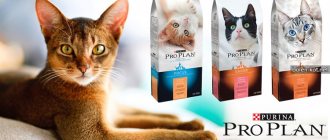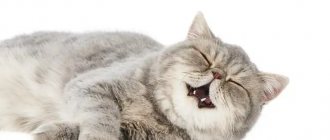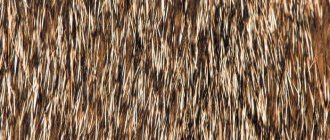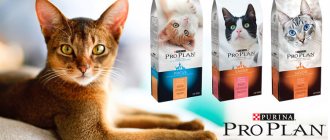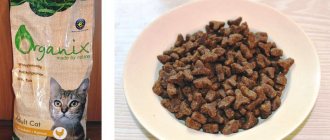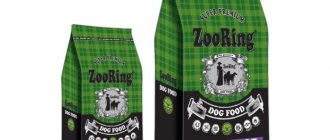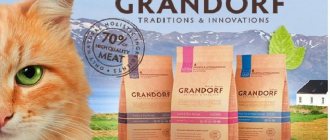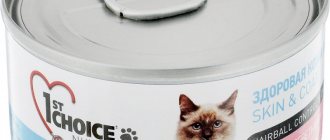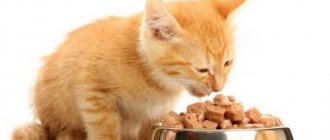What to feed an Abyssinian cat?
With careful care and a nutritious diet, “Abyssinians” (as they are also popularly called) can live for more than 20 years.
The diet for a cat must be selected taking into account several factors: what physical condition the animal is in at the moment; did the veterinarian give any instructions regarding feeding; what did the cat's ancestors eat? age. Do not overfeed your Abyssinian pet: there have been cases when the animal could not stop at the sight of a bowl full of food, and then suffered from digestive tract disorders.
Nutrition should be balanced and contain the required number of vitamins and microelements. The basis of the diet is dry food, and natural products are suitable as treats.
Increased attention should be paid to a pregnant Abyssinian cat: she needs to be fed at least 5 times a day. Include additional vitamins in your pet's diet for the health of future kittens: food with an increased value of nutrients is suitable.
If a pregnant Abyssinian dog begins to shed, this is normal. The body adapts to an unusual role.
It is not recommended to feed pregnant cats fish, but you should treat your pet with milk or kefir as often as possible.
To increase lactation, the expectant mother is advised to give nettle leaves, which must first be doused with boiling water. Feed the cat at her first request, so that in the future the kittens will have enough mother’s milk and will not have to be supplemented with formula feeding. Pet stores sell special food for lactating cats.
After castration and sterilization, food containing fluoride and magnesium should be removed from the cat's diet. Eliminate fish from the menu completely: eating it can lead to the appearance of stones.
On store shelves you can easily find dry food labeled “for sterilized cats,” so give them preference. It is necessary to add fermented milk products, as well as cereals and vegetables to the diet of Abyssinian cats.
Often, people's excessive love for their four-legged pets leads to health problems. In advanced cases, death cannot be ruled out. Take a closer look: is your “Abyssinian” overweight?
If you find it, significantly reduce your usual portion of food. Choose other supplementary foods that are lighter in calories. For cats who are losing weight, you can find a low-calorie mixture in the pet store that replaces dry food. Also give your pet more clean water.
Experts advise not to feed a cat that is in heat for at least one day to calm the body. After the estrus has stopped, the diet should be returned to its previous regime.
There are rare situations when a cat categorically refuses to eat dry food. In this case, the daily portion of regular food should increase by 2-3 times. Bone meal and vitamins (especially calcium) are added to dishes at every meal.
Dry food for Abyssinian cats
It is best to change it from time to time: after all, felines also want variety, and food allergies may also develop. It is better not to save on the cost of food: the health of your pet directly depends on it.
With this diet, the cat should drink 120-150 ml per day. clean water. Refresh the water in the bowl at least 2 times a day. Choose dishes for your cat that are heavy enough so that she has no chance of knocking them over. Let the dry food be in the bowl all the time, even if you are not at home, the cat will always be able to eat it.
Dry food is able to clean the animal’s teeth and does not create microflora for the development of microbes.
It is not recommended to feed the Abyssinian wet food: it can only be used as an addition to the main diet. On store shelves you will find it in the form of pate or pieces of meat in jelly.
Buyers rarely look at the composition of wet food. The effect of psychological deception is triggered: if there are pieces of meat on the packaging, then there must be meat inside. However, this is not the case. Meat components in such feeds contain no more than 4%. If you still want to buy wet food for your pet, opt for premium and higher brands.
Natural nutrition
Natural food should be included in a pet’s diet only when dry food is abandoned - veterinarians do not recommend mixing these two types of food.
Protein is an essential part of the diet of Abyssinian cats. From the meat range, a cat can choose chicken (be careful - animals have allergies), lamb and beef, but it is better to exclude pork: it may contain helminths (parasitic worms). Simply boil your chosen meat and then cut it into small pieces.
Fresh meat is also suitable for consumption, but it should be doused with boiling water before serving. Buy meat products only from reliable suppliers, ask for all accompanying documentation for the products.
If your cat loves fish, give preference to marine species. It is worth starting to introduce a new variety in small portions; if the cat eats food with pleasure and does not have problems with the digestive system, feel free to increase the volumes. Some cats are not averse to eating shrimp.
It is allowed to include fermented milk products in the menu: sour cream, kefir, cottage cheese. But you should not overfeed the “Abyssinian” with “milk” - this can cause an upset stomach.
Sometimes cats love vegetables and fruits. Try offering your pet a piece of carrot, apple or melon. If your cat appreciates this taste and the product does not cause allergies, feel free to include fruit in your diet.
The following products are not allowed into the diet: meat bones and fat in their pure form; smoked meats; salty fish; products containing sugar.
Prohibited Products
It is important to exclude prohibited foods from the Abyssinian kitten’s diet:
- Bones, pure fat, skin, especially poultry.
- Palm oil.
- Grapes, raisins.
- Juicy and sweet fruits.
- Soy.
- Mushrooms.
- Corn and semolina.
- Raw freshwater fish.
- Dry, salted fish.
- Products containing sugar or its substitutes, xylitol (chewing gum, some sweets), flour or yeast, caffeine, cocoa, any stimulants (sweets, tea, coffee, chocolate), marinades, salt, spices.
- Smoked products, including sausages, balyki, fish.
- Expired products.
- Dog food.
- Leftovers from the table.
Controversial foods in the diet of an Abyssinian kitten are:
- Fresh pork is a source of helminths and false rabies.
- Raw ocean fish are a source of helminths.
- Whole milk – risk of individual intolerance.
- Chicken eggs are an allergen.
- Factory-bred chicken is an allergen.
- Raw and boiled chicken liver in large quantities - raw liver in large quantities can lead to the development of diarrhea, boiled liver - to constipation.
- Cereals.
Many veterinarians and experienced cat owners do not recommend including grains in their diet. The reason is that the cat's body produces enough carbohydrates to nourish the nervous system. Carbohydrates are synthesized even when feeding exclusively protein foods.
To maintain the balance of the diet, cereals are introduced into it, but it is better to give preference to rice and buckwheat.
Breed Features
To raise a healthy Abyssinian kitten, before choosing a diet for their pet, owners must study and know the characteristics of the breed. Abyssinians are a rather fastidious breed to care for and maintain.
Important! Unlike other cat breeds, Abyssinians are more prone than others to intestinal disorders and food (nutritional) allergies. Therefore, the choice of diet and nutrition must be approached with all responsibility.
Abyssinian cats are inquisitive, active, energetic, playful and very sociable. These are clean and tidy animals. They have a sharp mind, high intelligence, and a well-developed hunting instinct. They rarely act out of spite; they are not vindictive, but touchy.
Abyssinians are unobtrusive, but require attention, affection, and respect from their owners. If you treat your cat with all respect and give it warmth and care, your pet will be a loyal friend, companion and will gladly share your interests.
Since Abyssinian cats are not large breeds, they should be fed often, but in small portions. By the age of one year, the kitten must be accustomed to a certain diet and diet.
Nutrition for illnesses
In many clinical diseases, diet is of great importance. Of course, it does not replace medications, but it can speed up the recovery process for a sick pet. Abyssinians are considered a relatively healthy breed; they rarely suffer from genetic diseases. But, like all cats, with age or due to stress or an unbalanced diet, they can develop kidney disease, liver disease, allergies, obesity or gastrointestinal disorders.
Medicinal food for Abyssinian cats
- Hill's Prescription Diet Metabolic + Urinary Feline dry – excess weight, urolithiasis;
- Hill's k/d – kidney diseases;
- Hill's z/d – treatment of food allergies;
- Hill's w/d – colitis, constipation;
- Hill's i/d – gastrointestinal diseases;
- Royal Canin Urinary S/O LP34 – stones in the bladder;
- Royal Canin Fiber Response – constipation;
- Purina Veterinary Diets UR – urolithiasis;
- Purina Veterinary Diets NF – kidney pathology;
- Purina Veterinary Diets OM - obesity.
Important: it is unacceptable to prescribe a therapeutic diet on your own - veterinary food, like medications, must be prescribed by a doctor.
Choosing a place and dishes
For a comfortable stay, Abyssinian cats need to equip a house for sleeping and relaxing. It is placed in a secluded place, where the kitten spends the most time. You cannot place a cat house near household heating appliances or in drafts.
Important! The choice of place and dishes depends largely on age and character. Individual characteristics of your pet.
As for bowls, a cat should have 2-3 bowls. Two are for food. One may be deeper and wider, the second with several compartments. The main thing is that the kitten’s whiskers do not rest against the sides during the meal. For water, choose a deeper bowl so that your pet can drink comfortably.
You can buy special bowls for kittens. But remember that animals grow quickly, so you can give food to a small pet from bowls for adult cats.
Bowls can be:
- made of durable plastic;
- ceramics, clay;
- stainless steel
Important! Do not use aluminum containers for feeding cats or drinking water. Aluminum releases harmful chemicals, especially when exposed to high temperatures.
Set up a place where your pet will eat. This should not be a pass-through place. If there are other animals in the house, place bowls on the nightstand, windowsill, or other elevated surfaces. No one should disturb the kitten while eating.
Place the water bowl further away from the food bowls. Residues of food should not get into drinking water. This is unsafe for the pet's health.
Keep your cat's dishes clean and rinse them with clean running water after each feeding without using household chemicals.
What food should I give to an Abyssinian with food allergies?
Due to intolerance to certain foods, cats develop food allergies, which cause unbearable itching. These cats are given food containing a minimum amount of ingredients. The fewer ingredients, the lower the risk of allergies.
For cats with food allergies, the LID Limited Ingredient Diets® or Instinct Limited Ingredient Diet lines are well suited. They are designed for cats of all ages and contain no artificial colors, flavors or preservatives.
What to feed an Abyssinian kitten
Feeding Abyssinian cats must be approached very responsibly. It is especially important to choose a diet for kittens of this breed. Nutrition should be complete, fully balanced, fortified and varied with a natural type of feeding.
You can feed Abyssinian kittens:
- natural fresh products specially prepared for your pet (natural diet);
- high quality ready-made industrial feeds (ready-made rations).
You can also choose a combined or mixed diet for Abyssinians. But remember that each diet has both its advantages and disadvantages. Therefore, when choosing a diet for your furry pet, take into account the speed of its development, activity, physiological, individual, breed characteristics, and health status.
What you should never give to cats
Neither kittens of any age nor adult cats should be offered: - poultry bones: sharp fragments can cause perforation of the stomach and intestines; - any type of pork - such meat immediately increases cholesterol; - fatty foods: the only fat may be a limited amount of vegetable oil; - river fish that has bones and parasites that do not die when cooked; — confectionery products of any kind; - fresh white bread, especially rich bread; - flour dishes - pancakes, pies, pasta; — marinades, pickles of any kind; - fried smoked food, any sausages. It is unacceptable to offer leftover dishes from the hosts’ table or stale food, as well as very liquid soups in large quantities.
Natural diet
Natural food, according to many breeders and veterinarians, is the best option for feeding cats. But in the case of the Abyssinian breed, it is very important to achieve the maximum balanced natural diet. This breed is prone to allergies, intestinal disorders, and gastrointestinal diseases.
Benefits of a natural diet:
- the owner is confident in the quality and freshness of food;
- the pet receives a varied menu;
- natural food is somewhat cheaper than feeding with high-quality feed;
- You can choose the ideal diet for your pet, taking into account his taste preferences.
About treats for cats
It is impossible not to pamper an Abyssinian who has become a pet with tasty treats. The special treats produced for cats are not food, but they add variety to the regular diet, which has a beneficial effect on the mood and health of the pet. Manufacturers add only natural ingredients (meat, cheese, fish) and healthy vitamins to all sorts of “mnyams” and “mur-r-meladas”. The treat can be either a dessert or a reward for completing a rule or trick, but in no way should it upset the overall nutritional balance. The negative aspects of pampering include: - getting used to tasty things and refusing regular food; - the risk of gaining excess weight due to the caloric content of products; - incompatibility with the main, especially dietary, type of feeding, leading to disorders. The main thing is to let your pet understand that a tasty morsel must be earned. Proper nutrition is the key to the health of Abyssinian cats. A frivolous attitude towards the animal's menu, random feeding without taking into account the needs will lead to problems. Their solution is much more difficult and expensive than caring for high-quality cat food. Remember that not caring about a good diet can bring your pet illness, suffering, and early death of the Abyssinian cat.
Read all about the Abyssinian breed in the Main article
Ready diet
With a ready-made diet, Abyssinian kittens are fed wet, dry, semi-moist industrial food, canned food, and high-quality pates. The prepared diet should be varied. You should not feed your pet only, for example, dry food or wet food. Combine dry pads with canned food, pates, and treats for kittens.
Advantages of ready-made diets:
- no need to waste time preparing a varied menu for the cat;
- the brand line includes food for kittens of various age groups;
- dry food has a long shelf life;
- the manufacturer indicates the approximate daily allowance by age on the packaging;
- large selection of flavors.
The line of well-known brands also includes products for weakened animals, for kittens with a sensitive gastrointestinal tract, and pets prone to food allergies.
The best food for Abyssinian kittens:
High-quality feed has a balanced composition and contains all the necessary nutrients, vitamins, microelements, and amino acids. Holistics are intended for nutrition of Abyssinian kittens with sensitive digestion. Contains probiotics and enriched with B vitamins.
Is it possible to combine feeding with natural products and commercial feed?
It is forbidden. Ready-made commercial feeds contain all the nutrients in the right proportions. By feeding your cat additional foods, you upset this balance.
You need to feed either only natural food, or dry food and canned food. Dry food can be alternated with canned food, for example, dry food in the morning and wet food in the evening. Some of the owners give him a mixture of dry and wet food. But it all depends on the specific animal: some cats have a “strong” stomach, others do not.
Many owners of Abyssinian cats prefer to feed their pets only wet food for fear of developing urolithiasis, obesity and allergies.
Sample menu by age
Feeding Abyssinian kittens implies a clear organization of nutrition in accordance with the age of the kitten. Therefore, we present an approximate menu by age. Little kittens feed strictly according to the clock. As they grow older, the frequency of feedings decreases, but the volume of portions increases. Until 9-11 months, the pet should eat according to a set schedule and receive the same diet.
Feeding schedule and frequency:
- From birth to two weeks of age, kittens eat 9-10 times a day without a break for night sleep. They need to be fed every two hours. The baby should drink about 3-4 ml of milk at a time.
- From 14 to 18 days - 8-9 times a day without a break for night sleep. Approximately 5-7 ml of milk formula, milk substitute, is given.
- From 19 to 30 days - seven to eight times a day and one night feeding. Feed 10 ml of mixture.
- From one month to two – 7 times a day.
- From 2 to 3 months, kittens need to be fed 6-7 times a day.
Up to a month
The main nutrition of kittens from birth to one month is colostrum and mother's milk. With it, babies receive nutrients and initial immunity (protective antibodies).
If for some reason the kittens are left without a mother cat or the lactating female does not have enough milk, the owners take care of the small pets. Ideally, try to find another nursing cat to care for and feed the newborn kittens.
If this is not possible, the following is used for artificial feeding:
- formulas for infants without sugar and additives (Nutrilon, Malyuk);
- industrial cat milk substitutes (Babycat Milk from Royal Canin,
- Katzenmilch, Hartz, Gimpet Cat-Milk).
You can also prepare mixture for artificial kittens yourself using specially developed recipes. For Abyssinians, a Scott or Tailing mix is ideal . Recipes can be found on thematic forums or websites.
Feeding kittens
The diet for adult Abyssinian cats and small kittens cannot be the same.
Until the age of one year, an Abyssinian kitten should eat only mother's milk. If the mother cat does not have milk, formulas that can be purchased at a pet store will come to the rescue.
Before buying, it is best to consult with a specialist and buy the mixture that will be as similar as possible to cat milk.
Feeding the kitten begins at the thirteenth week. For feeding, you can use pates for kittens and baby meat food. Carefully study the composition of the products and check the expiration date.
Reference!
The Abyssinian kitten needs vitamins and supplements; they can be obtained in their natural form from greens or liver (chicken or beef).
In order for the baby to grow normally, he needs taurine, which is found in whole milk, raw red fish, turkey and live homemade yogurt.
Portions for kittens, naturally, should be several times smaller than for adult felines. A kitten has a tiny stomach: don't stretch it.
From birth to 2 weeks, Abyssinian kittens eat every 2 hours. In total, babies eat about 10 times a day. From 2 to 4 weeks, you can increase the feeding interval to 3 hours and feed the kitten 8 times a day.
Vitamins and supplements
A kitten's growing body must receive all the vitamins and mineral supplements necessary for health and development. There are complexes on sale designed for kittens starting from 2-3 months of age. It is best to use complex preparations (Gamavit, Tetravit, Trivit). At the same time, we note that vitamin supplements are necessary when keeping a pet on a natural diet. High-quality industrial feeds have a completely balanced composition and already contain all useful substances.
From available means, the diet is enriched once a week with fish oil (one drop for each feeding), dry yeast, and meat and bone meal.
Fresh drinking water should always be freely available to the animal, regardless of what the Abyssinian kitten’s diet is. Change the water twice a day. Keep the bowl clean.
Use settled, filtered soft water or still bottled water for your Abyssinian kitten.
